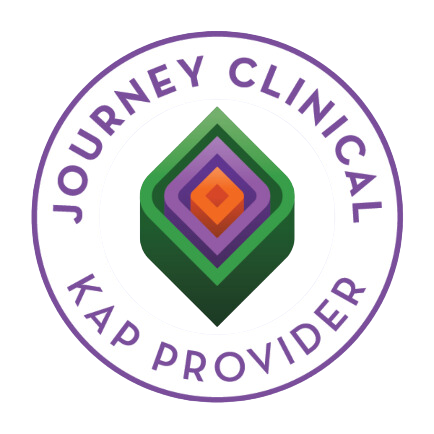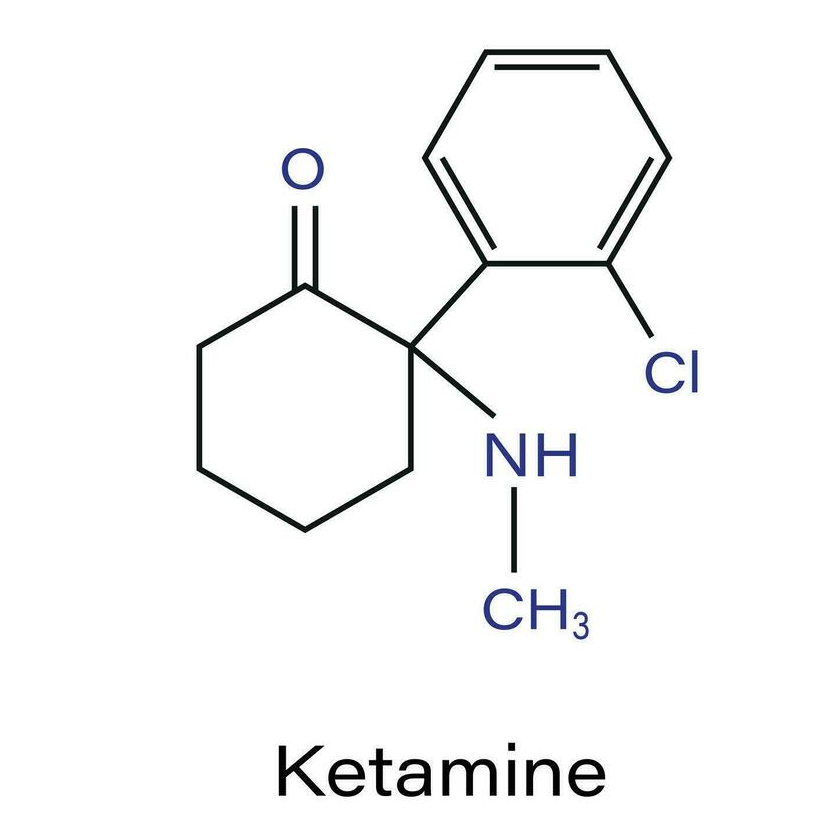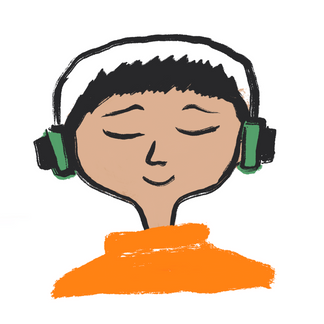Katamine-Assisted Psychotherapy (KAP)
Home > Journey Clinical
Ketamine-Assisted Psychotherapy (KAP) is a holistic modality in which ketamine is used as a complement to psychotherapy to help eligible patients experience more frequent breakthroughs and sustained improvement in symptoms. A licensed KAP provider takes on the psychotherapy portion of the experience, while Journey Clinical’s medical team supports you on all medical aspects. This includes determining eligibility, developing a custom treatment plan, prescribing the medicine and monitoring outcomes.

I am a Journey Clinical KAP Provider I offer a therapeutic modality called Ketamine-Assisted Psychotherapy (KAP), the use of ketamine as a complement to psychotherapy. I deliver KAP in my practice in partnership with an organization called Journey Clinical, which has a specialized medical team that determines eligibility for KAP, prescribes the ketamine, & supports us in monitoring outcomes. If you would like to explore the possibility of working with me on KAP, please e-mail me at [email protected] to discuss eligibility and next steps.”
What is Ketamine?
Ketamine is a legal, safe, and effective medicine used to treat a variety of mental health conditions, including depression, anxiety, and PTSD. Ketamine has rapidly-acting antidepressant and mood-enhancing effects, which can begin to take effect within 1-2 hrs. after treatment. It works by blocking the brain’s NMDA receptors as well as by stimulating AMPA receptors, which are thought to help form new synaptic connections and boost neural circuits that regulate stress and mood. Ketamine has also been shown to enhance overall neuroplasticity for lasting symptom improvement. Ketamine can be administered in a variety of ways, including IV infusion, intramuscular injection, nasal spray, and sublingual lozenges. At Journey Clinical we only use the sublingual lozenge form

How Does Ketamine Feel?
KAP has shown promise in treating conditions like treatment-resistant depression, PTSD, anxiety, and substance use disorders2. The dissociative effects of ketamine can facilitate deep psychological exploration and emotional healing making it a valuable tool in psychotherapy.
The effects of ketamine, which most patients find pleasant, last for approximately 45 minutes. These effects can make you feel “far from” your body, and facilitate shifts in perception that can often feel expansive in nature. Your motor and verbal abilities will be reduced, so you’ll be lying down in a comfortable position during the experience. Once these effects subside, your psychotherapist will spend the remainder of your appointment giving you space to process and discuss your experience. While it may feel hard to articulate what happens during the experience, patients feel like the insights gained are clear.

Please e-mail me at [email protected] to discuss eligibility and next steps.

How Does Ketamine-Assisted Psychotherapy Work?
Patient in therapy with member psychotherapist
Initial consultation with Journey Clinical prescriber, eligibility check and ketamine prescription
Preparation Session: Align on the process and set intentions for the KAP dosing session
KAP dosing session: Self- administer your ketamine lozenge with your therapist in-person or remote.
Integration session: Review memories, thoughts & insights that arose during your dosing session.
Follow-up consultations with Journey Clinical prescriber with refills if eligible
Please e-mail me at [email protected] to discuss eligibility and next steps.
What is The Cost?
Ketamine-Assisted Psychotherapy is an affordable, accessible modality. Although the medical intake and follow ups are not covered by insurance, they are eligible for out-of-network reimbursement.
What is Journey Clinical?
Journey Clinical is a platform for licensed psychotherapists to incorporate science-based psychedelic therapies in their practice safely and effectively, starting with Ketamine- Assisted Psychotherapy (KAP). Journey Clinical’s in-house medical team takes on patient eligibility, prescriptions and outcome monitoring, while I take on the therapy. Their collaborative care model is designed to deliver personalized treatment plans to meet your individual needs and improve long-term outcomes.
Visit www.journeyclinical.com to learn more

Need Help?
FAQs
How does Ketamine Feel?
The effects of ketamine, which most patients find pleasant, last for approximately 45 minutes. These effects can make you feel “far from” your body, and facilitate shifts in perception that can often feel expansive in nature. Your motor and verbal abilities will be reduced, so you’ll be lying down in a comfortable position during the experience. Once these effects subside, we’ll spend the remainder of our appointment giving you space to process and discuss your experience. While it may feel hard to articulate what happens during the experience, patients feel like the insights gained are clear.
Is Ketamine-Assisted Psychotherapy Safe?
Since its inception, Journey Clinical has designed its business around a patient-centered collaborative care model with rigorous patient safety policies and procedures in place to safeguard patient health and support their journeys toward improved clinical outcomes. Read about our commitment to patient safety and wellbeing here.
What Determines Patient Eligibility?
Patient eligibility is up to the sole discretion of Journey Clinical’s KAP-trained medical team. We currently only work with patients over the age of 18 who reside in one of our states. We currently support patients residing in the following states: CA, CT, CO, FL, GA, NY, NJ, MA, MD, MN, OH, OR, PA, TN, TX, VA, WA, WI.
What modes of KAP does Journey Clinical support?
Journey Clinical supports a variety of modes of the Ketamine-Assisted Psychotherapy to best fit each individual, including in-person, remote, group, and self-led sessions.
How is the KAP delivered?
At Journey Clinical, ketamine is prescribed as sublingual lozenges to be taken orally in order to be more accessible and cost effective.
How Do I get started?
Since Journey Therapeutics is already working with a Journey Clinical therapist, we will be happy to refer you to the Journey Clinical medical team for an intake consultation directly. Let’s setup a consultation and, once we refer your information to the medical team, you will receive an email with instructions. Please contact us and specify you are interested in KAP therapy. [Add the contact us button here]
Ketamine and Mental Health: A Comprehensive Guide
Introduction
Ketamine, originally developed as an anesthetic, has emerged as a groundbreaking treatment for various mental health conditions, including depression, PTSD, and anxiety disorders. Unlike traditional antidepressants, ketamine works rapidly, often providing relief within hours. This guide explores the history, common uses, legal status, and potential future applications of ketamine in mental health treatment, along with relevant citations to support its growing acceptance in medical communities.
History of Ketamine Use
Early Development and Medical Use
Ketamine was first synthesized in 1962 by Dr. Calvin Stevens at Parke-Davis Laboratories as a safer alternative to phencyclidine (PCP) for use as an anesthetic (Domino, 2010). Approved by the FDA in 1970, ketamine became widely used in surgical settings, particularly on the battlefield during the Vietnam War due to its safety profile and effectiveness as an anesthetic (Siegel, 1978).
Recreational and Off-Label Use
In the decades following its medical approval, ketamine gained popularity as a recreational drug due to its dissociative and hallucinogenic effects. Known colloquially as "Special K," its use in club settings raised concerns about abuse (Muetzelfeldt et al., 2008). Despite this, researchers continued to explore its off-label potential in psychiatry.
Discovery of Antidepressant Effects
In the early 2000s, researchers at the National Institute of Mental Health (NIMH) found that ketamine produced rapid antidepressant effects in patients with treatment-resistant depression (Berman et al., 2000). This discovery sparked a wave of research and led to the development of ketamine infusion therapy for mental health conditions.
Typical Uses of Ketamine in Mental Health
Depression Treatment
Ketamine is particularly effective for treatment-resistant depression (TRD), where traditional antidepressants have failed. Intravenous (IV) ketamine infusions and esketamine (Spravato), an FDA-approved nasal spray, have shown significant efficacy in reducing symptoms of major depressive disorder (MDD) (Zarate et al., 2006).
Post-Traumatic Stress Disorder (PTSD)
PTSD patients often experience intrusive memories, hyperarousal, and emotional numbness. Studies suggest that ketamine therapy can help reduce PTSD symptoms by promoting neuroplasticity and disrupting maladaptive thought patterns (Feder et al., 2014).
Anxiety Disorders
Preliminary research indicates that ketamine may help individuals with generalized anxiety disorder (GAD) and social anxiety disorder (SAD) by modulating glutamate transmission and enhancing synaptic connections (Glue et al., 2018).
Bipolar Disorder
Ketamine has shown promise in treating bipolar depression, which is often resistant to traditional mood stabilizers and antidepressants. Its rapid onset of action makes it a valuable option for patients experiencing acute depressive episodes (Diazgranados et al., 2010).
Obsessive-Compulsive Disorder (OCD)
Some studies suggest that ketamine can temporarily alleviate OCD symptoms by disrupting compulsive thought patterns and promoting cognitive flexibility (Rodriguez et al., 2013).
Addiction and Substance Use Disorders
Emerging research indicates that ketamine may help reduce cravings and relapse rates in individuals with substance use disorders, including alcoholism and opioid addiction (Dakwar et al., 2014).
Current Legal Landscape
Legal Status by Country
United States
• Medical Use: Ketamine is classified as a Schedule III controlled substance, meaning it has accepted medical uses but a moderate potential for abuse (DEA, 1999).
• FDA Approval: In 2019, the FDA approved esketamine (Spravato) for treatment-resistant depression, marking a significant milestone in psychiatric care (FDA, 2019).
• Ketamine Clinics: Private ketamine infusion clinics have proliferated across the U.S., offering off-label treatments for depression and other psychiatric conditions.
International Legal Status
• United Kingdom: Ketamine is classified as a Class B drug, but it remains available for medical use (Home Office, 2014).
• Canada: Approved for medical use, with growing acceptance for off-label psychiatric treatments (Health Canada, 2020).
• Australia: Ketamine-assisted therapy is gaining traction, with increasing clinical trials supporting its efficacy (Siskind et al., 2021).
Potential Future Uses of Ketamine in Psychiatry
Personalized Medicine and Biomarkers
Future research aims to identify biomarkers that can predict patient responses to ketamine, allowing for more personalized treatment plans (Krystal et al., 2020).
Combination Therapies
Combining ketamine with traditional psychotherapies, such as cognitive-behavioral therapy (CBT) or eye movement desensitization and reprocessing (EMDR), may enhance its long-term efficacy (Wilkinson et al., 2017).
Microdosing and Long-Term Use
Although current treatments involve high doses administered infrequently, some researchers are exploring the potential benefits and risks of ketamine microdosing for sustained mental health improvements (Dore et al., 2019).
Risks and Ethical Considerations
Potential Side Effects
- Dissociation: Patients may experience a temporary sense of detachment from reality (Mion, 2017).
- Cardiovascular Effects: Ketamine can cause increased blood pressure and heart rate, necessitating careful monitoring (Short et al., 2018).
- Cognitive Concerns: Long-term use may affect memory and cognition, though more research is needed (Morgan & Curran, 2012).
Ethical Issues in Accessibility and Cost
As ketamine therapy becomes more mainstream, concerns about accessibility and affordability have arisen. Currently, esketamine treatments can be prohibitively expensive, limiting access for lower-income patients (Singh et al., 2016).
Conclusion
Ketamine represents a major advancement in mental health treatment, offering hope to individuals with conditions resistant to traditional therapies. As research continues to uncover its mechanisms and potential applications, ketamine therapy is poised to play an increasingly vital role in psychiatric care. However, careful regulation, ethical considerations, and continued research are necessary to ensure its safe and equitable use.
References
- Berman, R. M., et al. (2000). Antidepressant effects of ketamine in depressed patients.
- Dakwar, E., et al. (2014). The use of ketamine for the treatment of addiction.
- Diazgranados, N., et al. (2010). Ketamine and bipolar depression.
- FDA (2019). Esketamine nasal spray for treatment-resistant depression.
- Feder, A., et al. (2014). Efficacy of ketamine in reducing PTSD symptoms.
- Glue, P., et al. (2018). Ketamine’s effect on anxiety disorders.
- Krystal, J. H., et al. (2020). Biomarkers for ketamine response prediction.
- Morgan, C. J., & Curran, H. V. (2012). Ketamine use and long-term cognitive effects.
- Wilkinson, S. T., et al. (2017). Combined psychotherapy and ketamine treatment.
